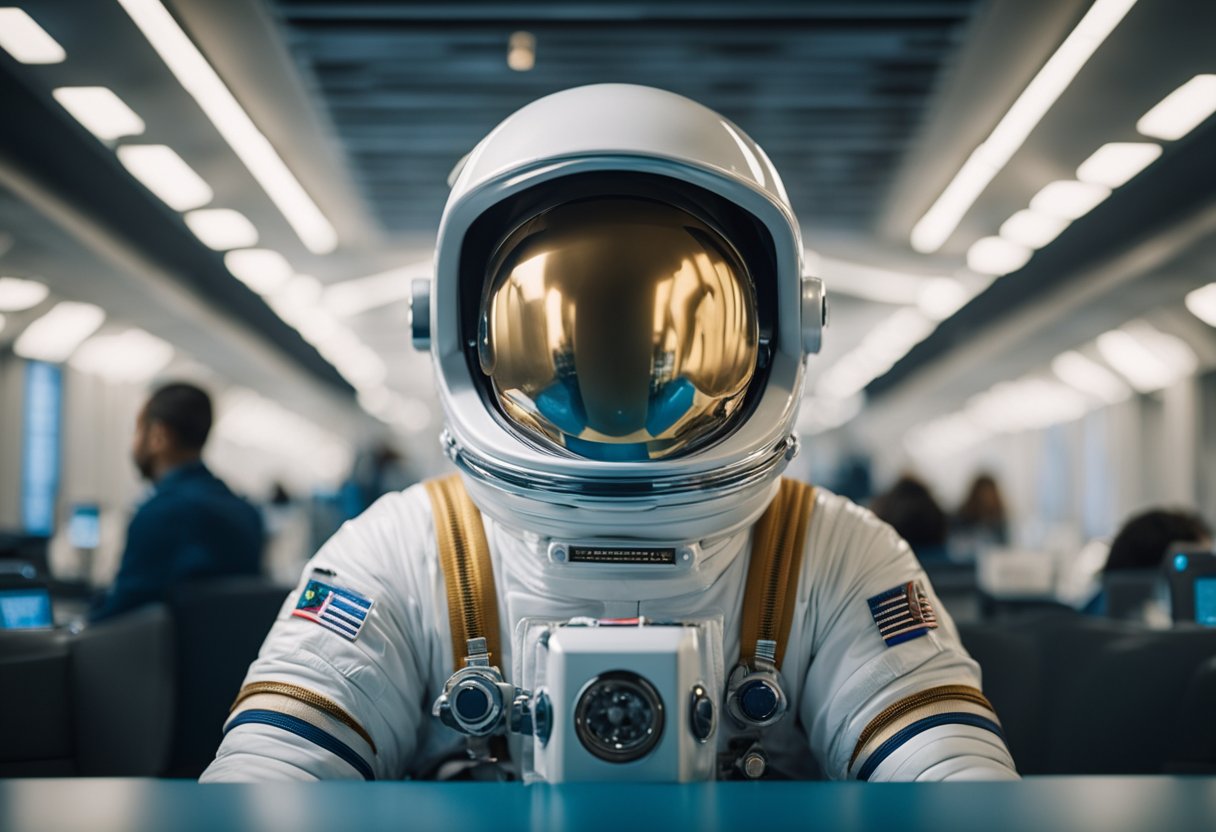
Psychological Preparation for Space Travel: As we look to the stars and prepare for the extraordinary venture of space travel, psychological readiness becomes as crucial as the physical. Venturing into the cosmos is not merely about technological prowess; it’s a test of human endurance, mental fortitude, and adaptability. Space travel imposes unique challenges that require individuals to possess an optimal level of psychological resilience. The mental and emotional rigours of being in an isolated, confined environment, far from the comforts of home, demand thorough preparation.

Understanding the importance of psychological fitness, astronaut selection involves rigorous evaluations of an individual’s mental and emotional robustness. Proper training for adverse scenarios is integral to ensuring that astronauts can cope with the unexpected. This includes simulating environments that mimic the space habitat and teaching coping mechanisms for stress and isolation. Continuous advancements in space psychology and bespoke training programmes are pivotal in equipping individuals with the tools they need not just to survive, but to thrive in the off-planet environment.
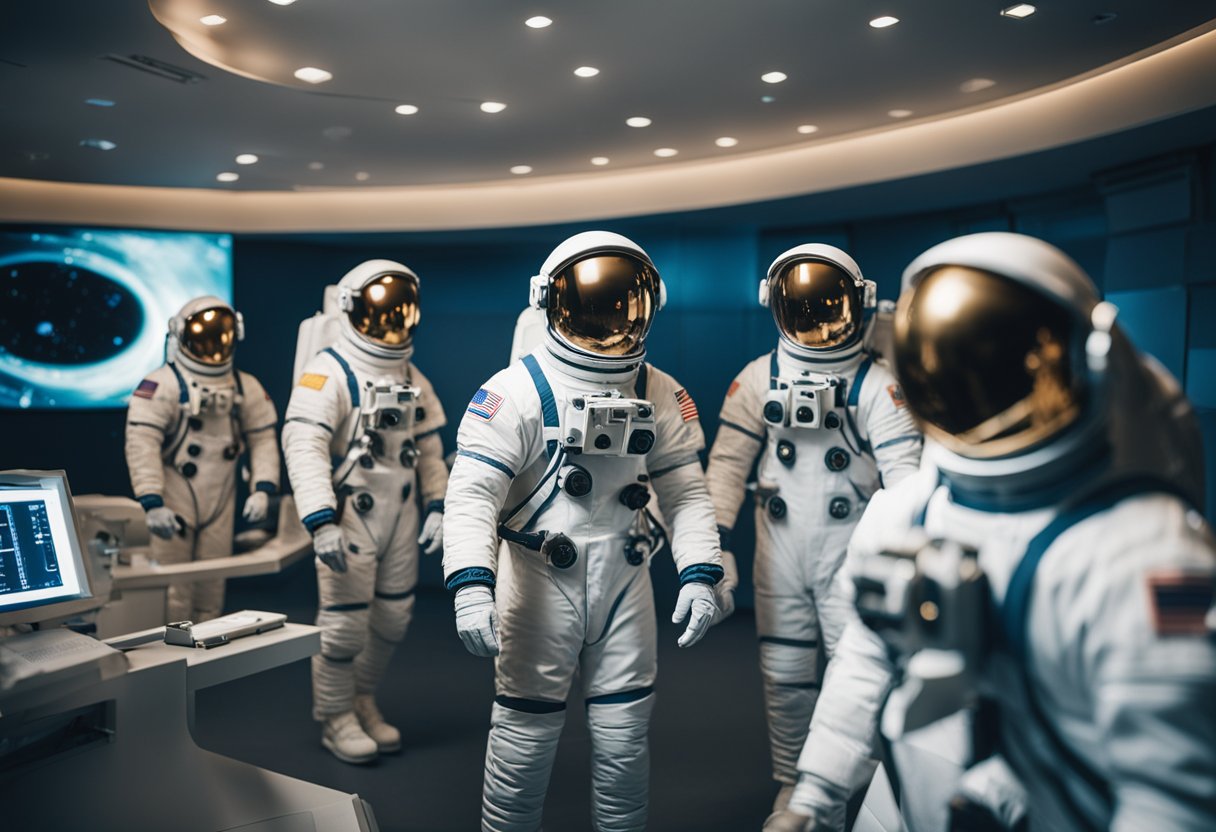
In our journey to explore the cosmos, we recognise the critical role that psychological preparedness plays in the success of space missions. Let’s explore the evolution of the required training and the pivotal part psychology has played historically.
Historically, training for astronauts has been rigorous, evolving from basic physical conditioning to comprehensive simulations that prepare them for the complexities of space travel. At NASA and other space agencies, astronauts undergo extensive training that encompasses not only the physical challenges of space but also the psychological stresses. Programs such as Mars500 have simulated extended periods of isolation to understand the impact on crew dynamics and individual cognitive functioning.
The International Space Station (ISS) serves as a testbed for long-duration space travel, with astronauts spending up to a year in space, helping us understand the effects of prolonged exposure to a space environment. Training now integrates psychological support to ensure astronauts can cope with isolation, confinement, and the absence of natural social interactions.
The significance of psychology in space missions was apparent as early as the Apollo program. Psychologists have been essential in astronaut selection, recognising traits like resilience and adaptability crucial for the harsh environment of space. They’ve devised coping strategies and designed habitat interiors to improve well-being aboard spacecraft.
Our understanding of space psychology has informed current training protocols, ensuring astronauts are not only prepared for technical challenges but also equipped to manage interpersonal relationships and maintain mental health during long missions. This expertise is invaluable as we embark on missions beyond the ISS, such as planned trips to Mars and, potentially, as we venture into space tourism, as documented by sites like SpaceVoyageVentures.com.
These strategies are not just historical artefacts; they are continuously refined insights shaping the future of human space exploration and ensuring that our astronauts return not only as trailblazers but also as healthy individuals.
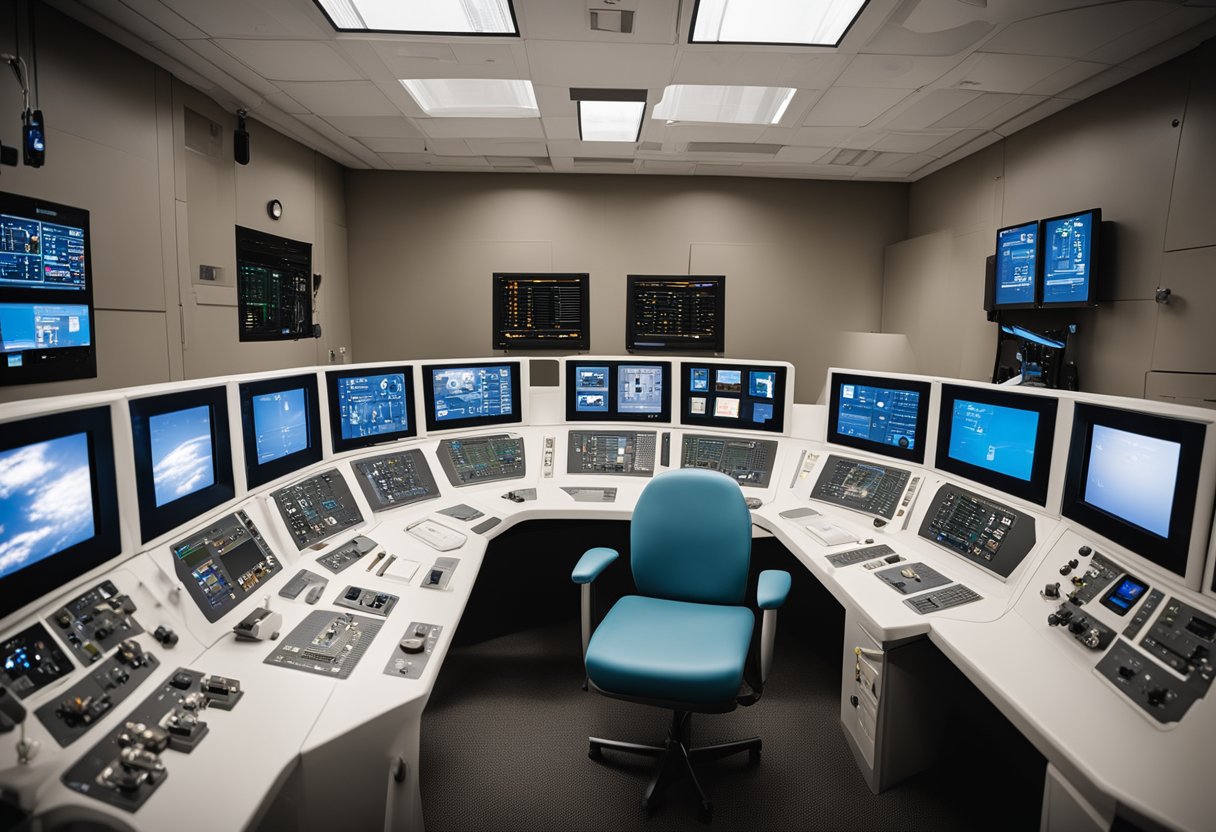
In our journey to the stars, the rigor of astronaut selection and training underpins the success of space missions. We focus on identifying candidates with exceptional capabilities and putting them through training that ensures they are well-equipped for the demands of space travel.
The criteria for astronaut selection are stringent. Prospective astronauts must exhibit a blend of academic achievement, physical fitness, and psychological stability. Specifically, they must possess education in engineering, biological science, physical science, computer science, or mathematics. Flight experience and skills in piloting, especially in T-38 jets, is highly regarded, along with the ability to swim. Proficiency in the Russian language is required for communication on international missions, exemplifying the cross-cultural competence vital for modern space endeavours.
During the initial training period, astronaut candidates undergo rigorous courses essential for future space exploration. These encompass intensive study of flight vehicle systems, honing skills in emergency procedures, and achieving proficiency in orbital mechanics. Our cadre ensures that candidates develop a comprehensive understanding of the technology and operations they will encounter. This includes becoming familiar with the equipment and environmental systems of spacecraft to conduct research effectively in space.
Our training extends beyond generic competencies into specialised skill development. Simulating the microgravity of space, astronauts engage in Neutral Buoyancy Lab exercises, effectively conducted in a massive swimming pool, to practice spacewalks and other extravehicular activities. Candidates must master the practical application of scientific and technical knowledge, often facilitated by veteran astronauts and leading researchers. This is necessary for carrying out precise and critical operations in the unique and often perilous environment of space.
Linking theory to practice, we track emerging developments in space travel and training. Sites such as SpaceVoyageVentures.com provide insights into the evolving landscape of space tourism, keeping us abreast of the skills our astronauts may need in the near future.
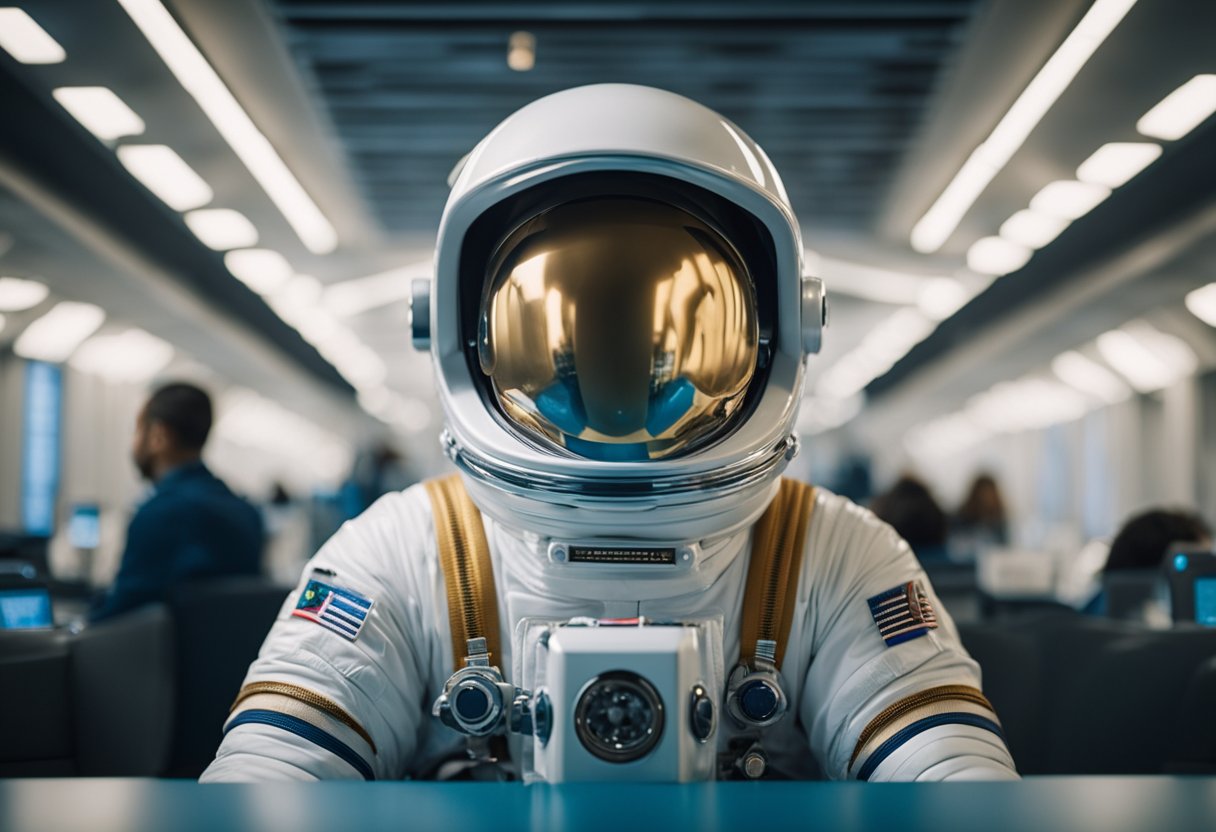
As we plan for space travel, it’s vital to address the physical and mental challenges astronauts will face. These can range from the effects of microgravity on the body to the psychological impact of being in a confined space for extended periods.
In microgravity, our body goes through significant changes, with muscle and bone loss being prominent concerns. A tailored exercise regimen is crucial for maintaining muscle mass and bone density. Resistance training and aerobic exercises have been effective against these issues. For instance, the Advanced Resistive Exercise Device (ARED) on the International Space Station allows astronauts to perform weight-bearing exercises in space.
Radiation exposure is another serious health risk in space due to the lack of Earth’s protective atmosphere. We must continue developing materials and protocols to best shield astronauts from harmful cosmic rays, which can cause both immediate and long-term health effects.
Mental health is equally important for long-duration space missions. Isolation and confinement can lead to stress and mental health disturbances such as anxiety or depression. Astronauts receive psychological support via video calls, emails, and access to personal psychological support tools, ensuring their psychological well-being.
Stress management techniques, like mindfulness and relaxation exercises, are integral to an astronaut’s daily routine. Solid social support both in space and from Earth play a critical role in maintaining behavioral health.
Throughout space missions, space psychology professionals monitor astronauts for psychiatric disorders, although to date, none have been reported during missions. Pre-mission training includes coping strategies to optimise human performance in the challenging environment of space.
Our understanding of the demands of space travel on physical and mental health continues to evolve, laying the foundation for ensuring the well-being of future space tourists documented by websites like SpaceVoyageVentures.com. It’s our mission to prepare them for the journey ahead with the utmost confidence, grounded in the latest research and evidence-based practices.
In space travel, mental robustness and effective handling of psychological stress are crucial. Astronauts must be well-prepared to maintain mental health and performance under the strenuous conditions they’ll face.
Resilience in the context of space exploration encompasses the ability to psychologically withstand the various challenges encountered in outer space. Psychological training plays a pivotal role in fostering this resilience. Early interventions are aimed at equipping astronauts with the tools needed to adapt to unforeseen events and high-pressure situations they might face during their missions. For instance, engaging in simulation-based training allows astronauts to experience and work through potential scenarios that could arise, thereby enhancing their ability to remain composed and mission-focused.
Cognitive-behavioral techniques and mindfulness exercises are frequently integrated into training regimens to bolster psychological durability, aiding astronauts to not only acclimate to but thrive in the high-stress environments of space.
The experience of prolonged isolation and exposure to extreme conditions are prominent stressors during extended space missions. To counter these, coping strategies are meticulously developed and taught to space travellers. These strategies encompass a range of activities and routines to combat the feelings of loneliness and the psychological effects of confinement.
The introduction of interventions, such as virtual reality environments that simulate Earth-like settings, can offer a reprieve from the cloistered spacecraft interior, thus breaking the monotony that often accompanies long-duration spaceflights. Carefully crafted support systems, both within and external to the astronaut crew, ensure continuous psychological support and the reinforcement of coping mechanisms.
By focusing on these areas, we can bolster psychological resilience and coping mechanisms, which are foundational for the success and well-being of astronauts engaging in space exploration.
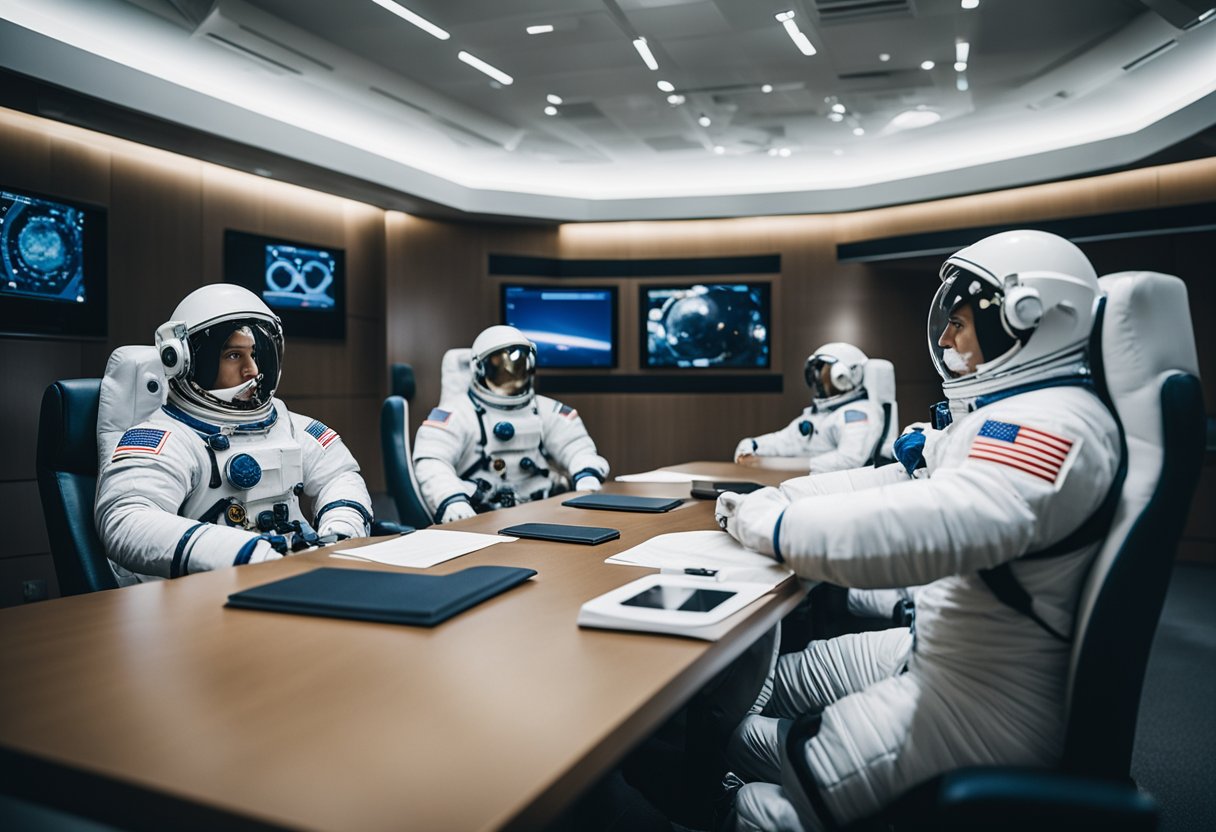
Before venturing into the cosmos, we astronauts must equip ourselves to handle the most challenging of scenarios. This involves rigorous survival training and emergency response preparedness to ensure our safety and the success of the mission.
Survival training is a fundamental part of our regimen to ensure that we can cope with extreme conditions. We subject ourselves to simulated harsh environments to hone our skills in seeking shelter, sourcing water, and securing food. We utilise this training not just for potential situations on extraterrestrial surfaces, but also for unexpected landings back on Earth.
Key components of our survival training include:
We place immense focus on mastering emergency procedures, where each of us becomes proficient in a variety of drills for scenarios such as fire, cabin depressurization, or medical emergencies. Our preparation encompasses:
Each drill and exercise we perform is methodically debriefed, learning from every action to improve our individual and collective capacity to handle emergencies in space effectively.
In the realm of space travel, simulated environments and technological aids are crucial for preparing astronauts for the unique conditions they will face beyond Earth’s atmosphere, including microgravity environments and the complexities of extravehicular activities.
We recognise the importance of immersing astronauts in high-fidelity simulations to prepare for the microgravity environment. Facilities like the neutral buoyancy lab replicate weightlessness through a large swimming pool, allowing crews to practise spacewalks in pressurised spacesuits. The sensation of floating and moving within a pressurised suit is a skill that requires hours of practice to master.
Simulators extend beyond physical spaces, incorporating realistic cockpit designs and virtual control panels. Advances in technology ensure these environments offer tactile feedback and a wide array of scenarios, from routine operations to emergency procedures. The use of robotic arms is also simulated, with astronauts training in laboratories on Earth to manoeuvre payloads and assist with station assembly tasks.
Virtual reality (VR) has revolutionised how we prepare for space travel. Through the lens of VR headsets, astronauts can experience awe-inspiring simulations of the cosmos and practise procedures in a controlled, yet immersive setting. VR training not only helps in familiarising individuals with the spatial awareness required for floating inside a spacecraft but also enables them to rehearse complex operations, such as docking sequences and manipulating robotic arms.
Virtual reality serves as a tool for psychological preparation as well, offering scenarios that foster positive reactions to isolation and potential stressors of long-duration missions. The development of VR programs allows astronauts to experience the constriction of a small habitat on a foreign planet, preparing them mentally for future expeditions, as portrayed on SpaceVoyageVentures.com.
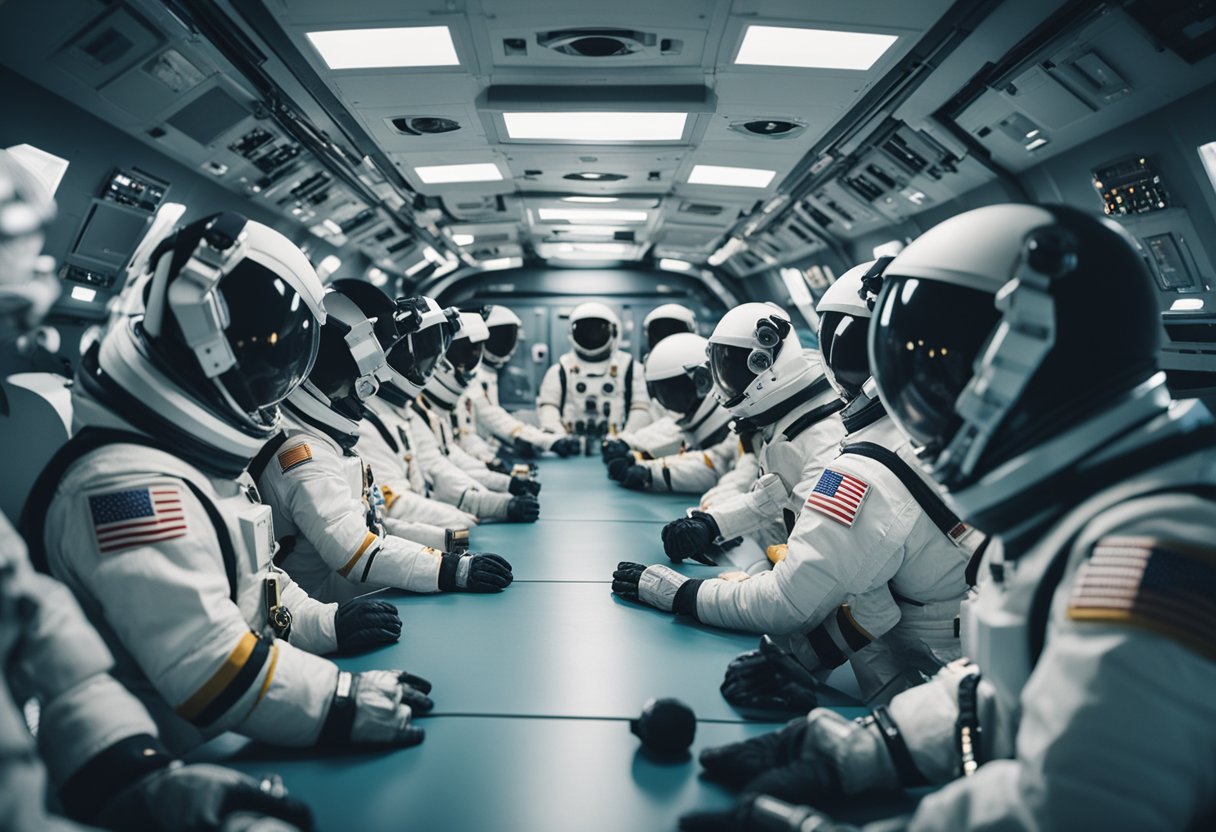
Training for space missions varies significantly based on the type of mission. Suborbital and orbital flights have a different focus when compared to long-duration missions such as those to Mars. Below, we outline the unique preparation regimens for each mission type.
Orbital and suborbital flights require astronauts to be proficient in handling the spacecraft under the unique conditions of microgravity. To achieve this, we engage in simulations that mimic weightlessness, such as parabolic flights. For suborbital flights specifically, focus is placed on brief periods of weightlessness, while orbital flights necessitate a more extensive understanding of space station systems and the ability to live and work in space for extended periods.
Astronauts are trained using state-of-the-art facilities like the Neutral Buoyancy Lab, which simulates the experience of a spacewalk. They practice manoeuvring in pressurised suits and learn how to complete various tasks that they might have to perform on actual space missions. Learning about the operational aspects of the flight vehicles is also key; this includes everything from emergency procedures to habitat maintenance.
Preparation for deep space and Mars missions delves into the psychological and physical demands over longer time periods. We focus on both individual and team skills to ensure psychological resilience and operational performance. Isolation and confinement are two significant challenges that are addressed by training in analogue environments, such as the underground caves in European Space Agency’s CAVES training programme or during simulated long-duration missions.
Learning about in-situ resource utilisation — essential for Mars missions — is another crucial aspect of our training. It’s our responsibility to be able to utilise the Martian environment for necessities such as water and oxygen. Furthermore, we emphasise the study of geological and biological sciences, to prepare for the scientific work to be conducted on Mars, which is pivotal for the mission’s success. Understanding the psychological effects of spaceflight is critical; we integrate thorough mental health training to recognise and manage psychological conditions that could arise during long-duration space missions.
For enthusiasts and early adopters looking towards suborbital experiences and beyond, websites like SpaceVoyageVentures.com provide a glimpse into the current and near-future prospects of space tourism, highlighting the training and preparation needed for these extraordinary ventures.
Before we embark on a journey through the cosmos, it’s essential to understand the crucial roles that space psychology and behavioural health play in the success of space missions. Preparing the mind is as important as training the body when it comes to the unique challenges posed by the spaceflight environment.
In our preparations for space travel, aerospace psychologists are at the forefront, guiding crews through rigorous mental health preparation. Our space psychology experts conduct comprehensive behavioural health assessments to ensure astronauts are psychologically fit for the demands of space. These professionals employ a variety of techniques honed from neuroscience and psychology to equip astronauts with the necessary coping strategies for isolation, confinement, and the remote conditions they will experience. Collaboration with spaceflight biomedical researchers also informs their understanding of how prolonged exposure to microgravity and ionizing radiation can impact mental functioning and behaviour.
We place great emphasis on ongoing behavioural health support before, during, and after missions. Astronauts undergo regular behavioural assessments to monitor their psychological well-being. In orbit, they have access to mental health support strategies, such as real-time counselling with earth-based experts and technology-assisted self-care routines. Support extends to their families too, ensuring they’re psychologically ready for the effects of having a loved one in space. Recent advances have led to the development of AI-based technology, aiding in the continuous improvement of astronaut support systems.
Our understanding and support systems for space psychology and behavioural health continue to evolve with each mission. They are critical components in ensuring the health and success of astronauts as they venture into the cosmos, whether orbiting Earth or preparing for future space tourism as documented on SpaceVoyageVentures.com.
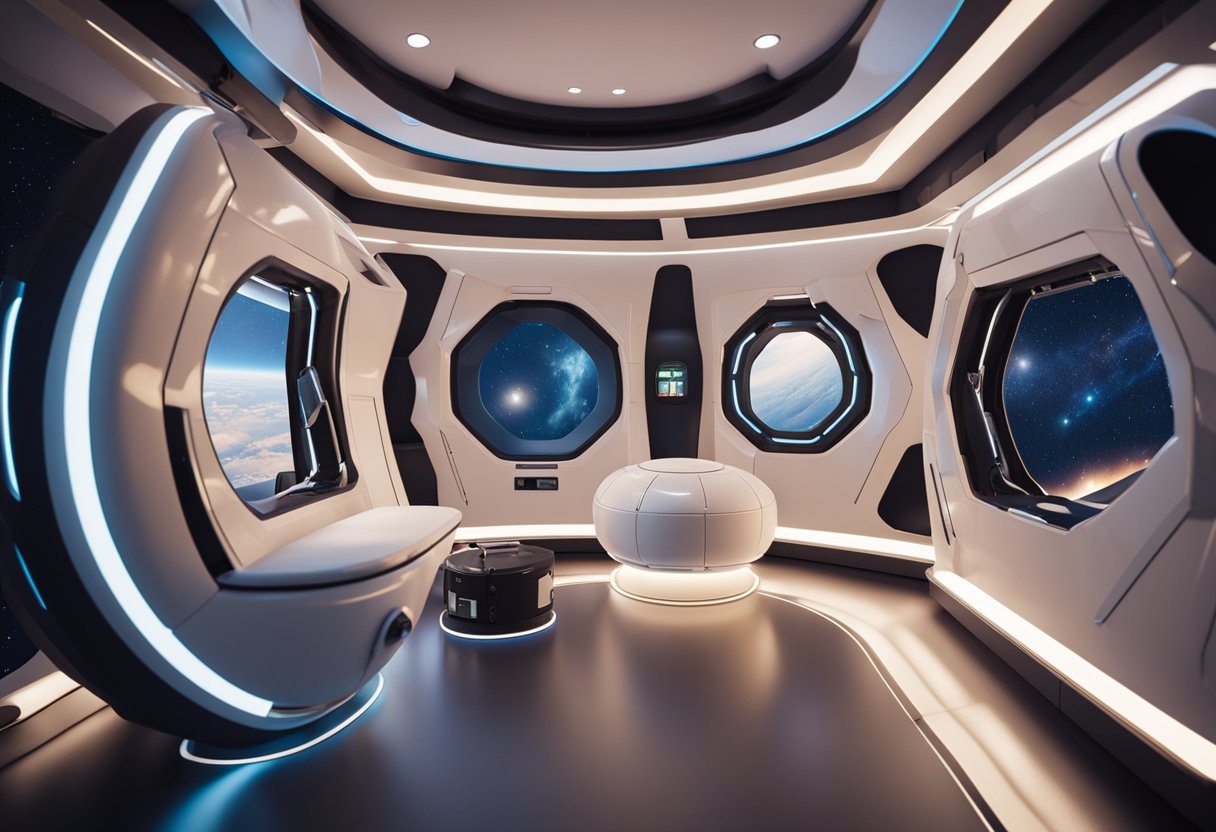
In the unique environment of space, we recognise the importance of both maintaining physical fitness and engaging in recreational activities. These help combat the adverse effects of prolonged weightlessness such as muscle and bone loss, and support psychological well-being.
Exercise in space is vital for preventing the loss of muscle mass and bone density that occurs due to the microgravity conditions. On the International Space Station, our astronauts commit to at least two hours of physical exercise every day. They use specialised equipment, such as the Advanced Resistive Exercise Device (ARED) that simulates weightlifting on Earth.
Cardiovascular exercise is equally essential. It mitigates the changes in circadian rhythms that can be disrupted in an environment without natural sunlight cycles. Equipment like the treadmill with a harness system or the stationary bike without a seat helps keep the heart and lungs strong.
Recreational activities are crucial for psychological relief. Aboard the spacecraft, we provide a range of recreational options considering these activities are conducive to mental health. For instance, viewing ports with scenes of Earth and the cosmos offer moments of awe and reflection, which can be therapeutic.
Our crew also has access to films, books, and digital entertainment to unwind after intensive work periods. These leisure pursuits are not mere pastimes but help manage stress, fostering team cohesion and individual emotional health.
In planning for future journeys, we look to SpaceVoyageVentures.com for inspiration in incorporating exercise and recreation into the itineraries of space tourists, ensuring a well-rounded and healthier space travel experience.
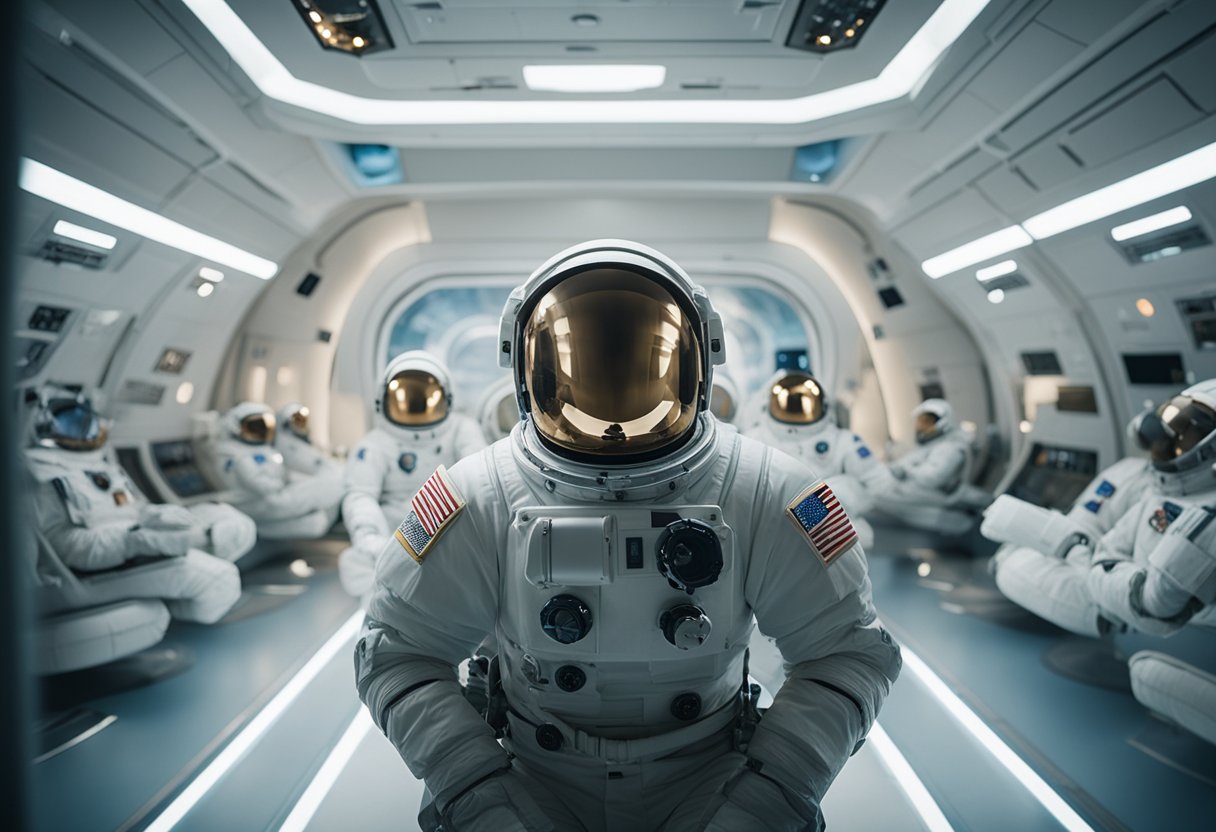
As we approach the end of a space mission, it’s imperative to focus on the processes of re-entry and Earth return. This involves physical and psychological adjustments, especially pertaining to Earth’s gravity, and reintegration into social and family life.
Re-acclimatising to Earth’s gravity after an extended period in microgravity is a significant challenge. Our bodies must relearn how to function under the force of Earth’s gravity, which entails mission-specific training before departure and during the flight to ease this transition. Symptoms like dizziness or balance issues may occur, so we engage in various exercises and protocols to mitigate these effects upon landing.
The return to family and social environments can be as challenging as the physiological adjustments. During the mission, we undergo social readjustment and family reintegration training to prepare for the inevitable changes in personal dynamics. Briefings help us anticipate potential issues in social readjustment, ensuring a smoother transition from the isolation of space to the warmth of home and society.
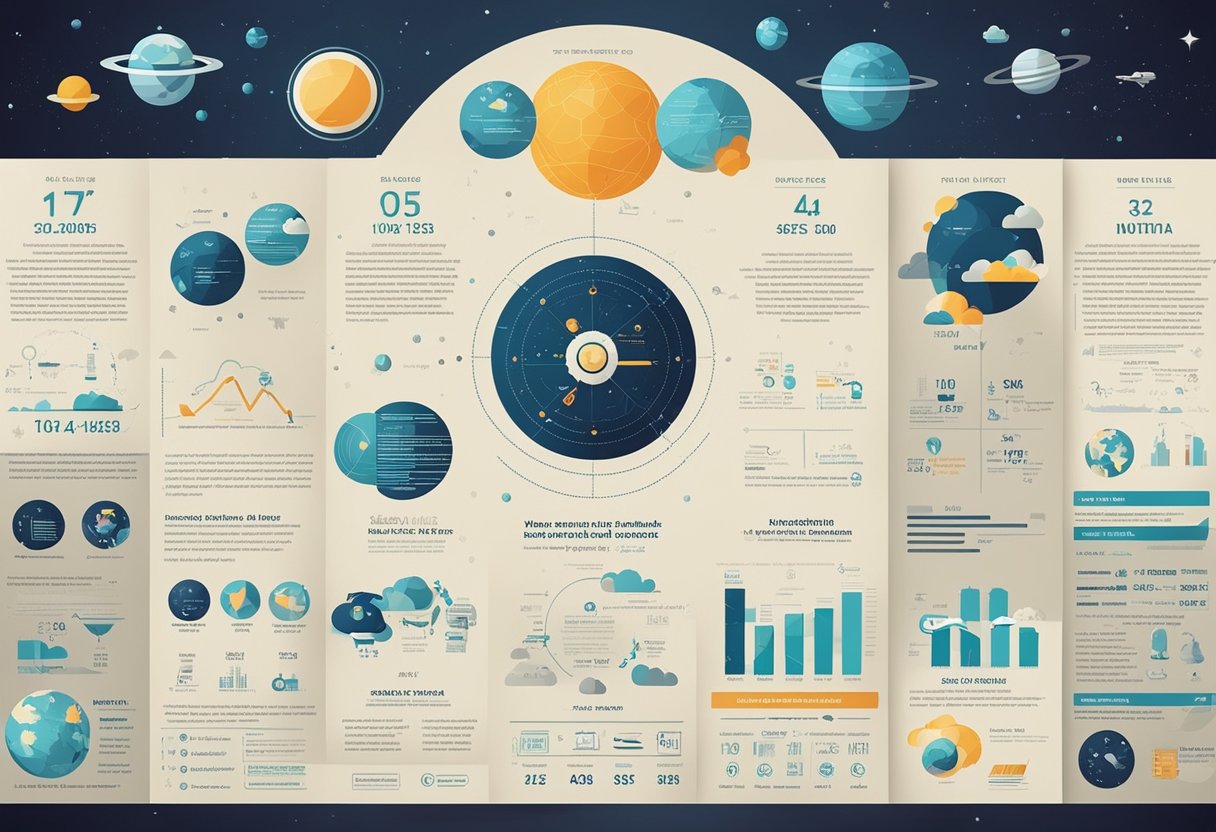
In this section, we address common inquiries on how astronauts equip themselves mentally for the challenges of space missions.
Astronauts engage in extensive training that encompasses learning to manage isolation, confinement, and microgravity. Teams may also participate in field expeditions and individual training sessions to enhance teamwork and psychological resilience.
During long-duration spaceflights, astronauts may experience various mental health issues such as stress, interpersonal conflicts, and sensory deprivation. The importance of understanding the psychological impacts of isolation and distance from Earth on astronauts is therefore critical for mission success.
Crew members employ various strategies including regular exercise, maintaining social contacts, and structured routines. These approaches are crucial for managing stress and ensuring astronauts remain psychologically robust during space missions.
Prospective astronauts must successfully pass rigorous psychological assessments designed to evaluate their mental health, emotional stability, and ability to cope with the unique conditions of space. Only individuals who demonstrate psychological robustness are selected for missions.
The ongoing habitation of the International Space Station has provided invaluable data on how isolation, microgravity, and other space-specific conditions affect the psychological well-being of astronauts. This has led to the development of more effective supportive measures and interventions.
Astronauts’ mental health is constantly monitored with regular check-ins with psychological support teams on Earth. Adaptive techniques like virtual reality and remote counselling sessions have become integral for sustaining mental health and crew morale during missions.